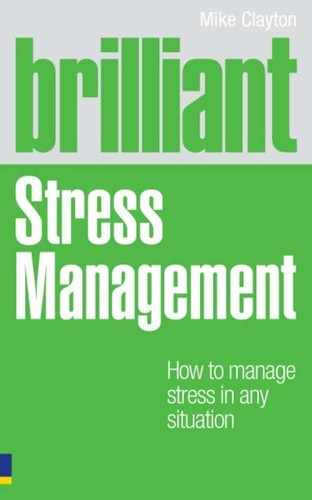W
e all think we know what stress is and that we can
easily recognise its symptoms. It seems that stress has
become more common in today’s society and there is
a risk that familiarity will breed contempt for it. But the long-
term effects of stress are worthy of far greater respect: stress can
destroy lives and families.
This chapter sets out to ensure that you can recognise the
signs of stress in yourself, so that you can take it seriously. It
will examine the science behind stress: the way our bodies are
designed to respond, and attempts to predict stress in people.
This will lead us to a formal understanding of what stress is,
which will be the basis for learning how to control it – and con-
trolling stress is the basis of this book.
Signs of stress
The earliest symptoms of stress are often subtle. A bit of anxiety,
feeling a little blue, getting easily ustered and angry, and
tiredness are all early warnings. You may also notice changes
in yourself and in your behaviour. Let’s look at some of the
common signs of stress.
Emotional signs of stress
As we get stressed, our levels of anxiety can cause us to respond
less appropriately to unexpected and unwanted events. Do you
4 brilliant stress management
sometimes nd yourself overly defensive or aggressive – some-
times even looking for arguments? Do you feel detached from
life, wanting to withdraw? Maybe your condence has dropped
noticeably and you nd yourself feeling guilty or inadequate
about every little failing.
Physical and mental signs of stress
One of the rst features of stress is often poor or irregular sleep
patterns, leaving you constantly tired (and anxious at bedtime).
You also start to get every little bug going around, leading to
a feeling of a constant cold with runny nose and sore throat.
Other signs of diminishing health are skin problems and cold
sores. Your digestion seems a little unreliable, leading to diar-
rhoea or constipation, and maybe you get more headaches than
you used to. Back and neck pain can often follow and all of
this leads to poor concentration and panic at not getting things
done or not being able to cope. There are a host of other signs
too, like an uncontrollable little twitch in one eye and a drop in
your libido.
Important note: Some of these symptoms could also be
signs of illness. If you are in any doubt, contact your general
practitioner.
Behavioural signs of stress
A rush-rush busy-busy lifestyle is not just a trigger, but a
symptom of stress, which leads to working longer and longer
hours. This leaves you less time to relax and take care of your-
self, so your appearance can start to suffer, as will your diet.
More fast food, sugary or caffeine drinks, chocolate, nicotine
and alcohol all indicate that you are trying to cope with stress;
maybe you have lost your appetite or, paradoxically, nd yourself
overeating. You may also notice yourself becoming more irritable
and argumentative as your patience is tried more and more.
Impatience leads to a short temper, forgetfulness and more

What stress is and is not 5
brilliant
exercise
Assess your symptoms. Count how many of each type of symptom
you have on a regular or long-term basis.
Emotions
1 Anxiety
2 Tearfulness
3 Aggressiveness
4 Withdrawal
5 Guilt
6 Inadequacy
Physical symptoms
1 Dodgy tummy
2 Headaches
3 Back, neck or shoulder pain
4 Poor sleep
5 Constant illnesses
6 Loss of sex drive
Changes in your behaviour
1 Working long hours
2 Bad diet
3 Argumentative and short-tempered
4 Forgetful
5 Less attention to your appearance and self-care
6 Making mistakes
mistakes and accidents. You are becoming a danger to yourself
and others.
..................Content has been hidden....................
You can't read the all page of ebook, please click here login for view all page.
